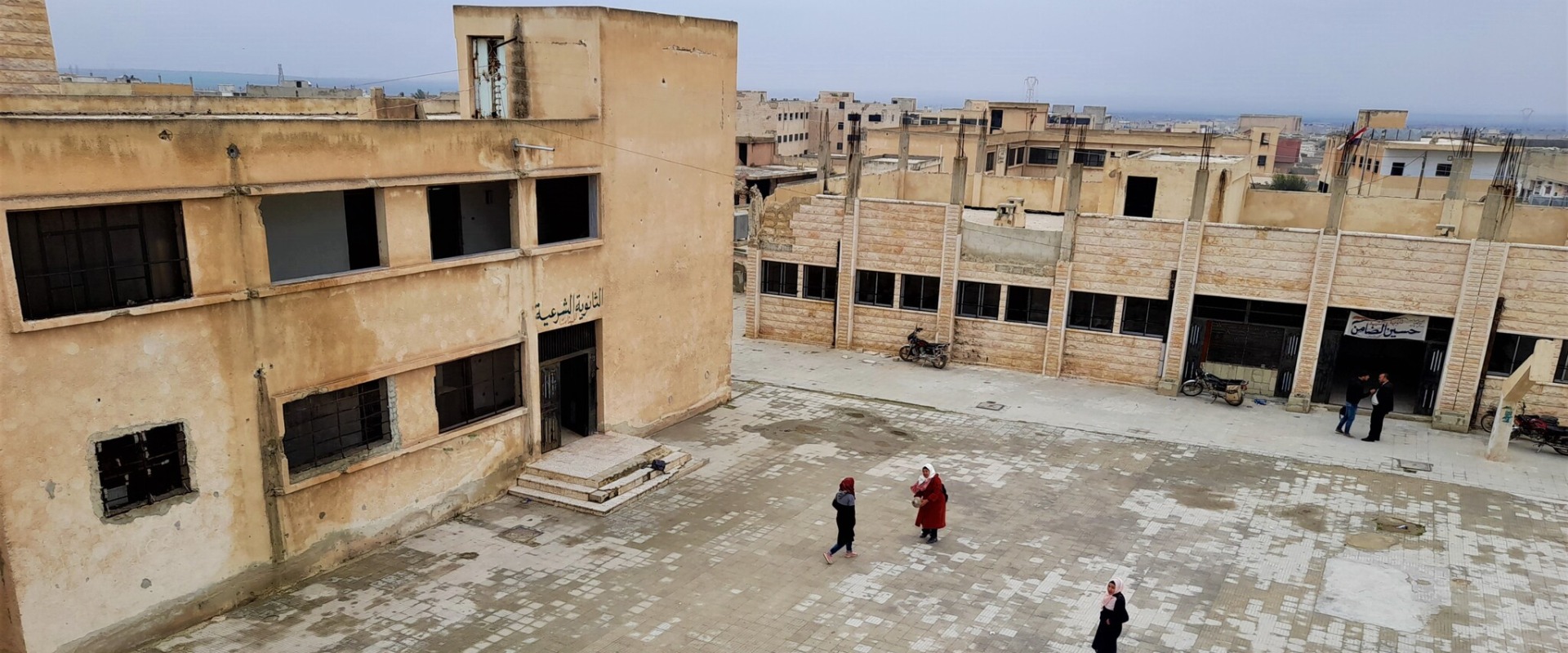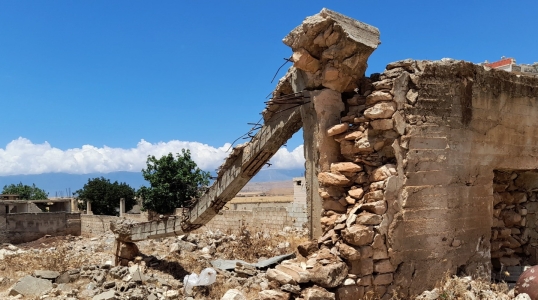
Help Children in Need Thrive

It’s been 12 years since conflict began in Syria, and the humanitarian need is greater than ever. More than 15 million people across the country are desperately in need of assistance. Those already impacted by the conflict have been hit twice as hard by recent cholera outbreaks, the COVID-19 pandemic, and severe earthquakes and aftershocks that left more than 50,000 dead and thousands more displaced.
Families in Syria face a multi-layered crisis, hit hard by food insecurity, environmental disasters, limited health services, lack of electricity, and widespread poverty. Yet, despite the challenges, local communities are demonstrating their resilience as we work together to ensure everyone has access to essential services.

Unprecedented Hunger
Syrian families now face the highest hunger levels in a decade. Nearly 70% of the population is in dire need of food assistance.
Food prices have skyrocketed in recent years. In 2022, costs were 86% higher than the prior year, and these prices will likely continue to rise, further exacerbating hunger.
For more than 15 years, our teams have worked closely with Syrian families to help them overcome hunger. We provide health and nutrition training, and work alongside community members to respond to emergencies.
Huda, an Action Against Hunger Community Health Worker, helps malnourished mothers and children. In one of her regular home health screenings, she discovered that new mother Salam was severely undernourished. Salam had just given birth, and a quick measure of her arm using a color-coded arm band showed that she was in desperate need of care from a nutrition clinic.

“After giving birth, I started suffering from severe fatigue all the time,” said Salam. “I had not experienced this feeling before, but I thought that it was normal after pregnancy and breastfeeding. I didn’t think of visiting the doctor, since it costs a lot of money, and we have other priorities.”
Without an intervention, it might have been too late for Salam to fully recover her health. After two months of follow-ups and regular consultations with Community Health Workers, Salam showed huge signs of improvement and she was finally on the road to recovery.
“I felt stronger and more capable of doing my domestic work and caring for children normally,” she said. “I think that this kind of aid and awareness for people is very important, especially since we are in a village that suffers from a lack of health services after the war, and we do not have access to the health information we need.”

Lack of Necessities
Many families throughout Syria lack access to basic health care. This is especially dangerous during emergencies, like the recent earthquakes, which left more than 50,000 people dead and thousands more injured.
Lamar*, a 37-year-old widow, lived with her five children in a rented flat when the disaster hit. She’s been her family’s main breadwinner since her husband passed away in 2016, and she earns her income as a seamstress. But her life and livelihood took a hit when she was injured in the earthquake.
“When the earthquake happened on Feb. 6, I ran out with my children without my veil and slippers, due to the feeling of fright and fear,” she said. “When I was running down the stairs, I slipped and was taken to the hospital to be diagnosed with a serious detachment of the vertebrae in my spine.”
Without a home to return to, Lamar was forced to live in a group shelter at a mosque. After a few weeks, the family moved again, this time to a shelter at a school. As the shelter grew more crowded with other displaced people, Lamar had to set up a tent in the school courtyard for privacy.

Spending the night outside in the courtyard was cold, and they didn’t have blankets. She was very thankful when Action Against Hunger provided her and her family with a sleeping kit.
Widespread Poverty
 Around 90% of Syria’s population lives below the poverty line. Prices for everything—food, fuel, medicine, basic services—throughout the country have risen dramatically in the last year alone, leaving many people unable to afford the cost of daily life.
Around 90% of Syria’s population lives below the poverty line. Prices for everything—food, fuel, medicine, basic services—throughout the country have risen dramatically in the last year alone, leaving many people unable to afford the cost of daily life.
Ali Haj Joumaa’, a 46-year-old father of seven, has been paralyzed since 2012 after an injury working as a truck driver.
“The accident forced me to borrow money from my relatives and neighbors to cover the medical expenses,” he said. “That later forced me to sell all the cattle I had before, to pay off the debt.”
Although Ali has scraped by, it becomes more expensive each year just to live with his condition.
“Watering the cattle is more difficult than feeding it, especially in our village,” he said. Even though Ali’s neighbors helped him to fill up an old water tank, it was not enough to water the cattle. He had to pay for additional water from private trucks once a month.
Then, Action Against Hunger provided Ali with a rainwater harvesting unit, a sustainable way to collect rainwater to water livestock. In the first few months after its installation, Ali estimated the tank saved him 150,000 Syrian pounds, or nearly $60 dollars.
 “The money that I saved allowed me to increase my daily food intake, and now we can eat the kind of food that we missed for a very long time,” he said.
“The money that I saved allowed me to increase my daily food intake, and now we can eat the kind of food that we missed for a very long time,” he said.
Food prices in Syria are at their highest point in history. People like Un Mahmoud are left with food that is rotten or inedible. She lives in northern Syria with her children, husband, and her husband’s elderly parents. After being displaced by conflict, they returned to their village to find their home completely destroyed and had to move in with relatives.
Power Crisis
One in three Syrians have access to less than two hours of electricity a day. The rising cost of fuel has made it impossible for many people to power their generators—for their homes, their health centers, and even their irrigation and water systems.
Um Alaa, a woman in her fifties, returned home to her village with her husband after they were displaced by the conflict.
“We are struggling here to maintain the basics, especially the bread,” she said. “We have to go to the city sometimes to bring it when the vendor doesn’t show up. The problem is that there is no electricity or a refrigerator, therefore, we can’t bring enough food for a week. Once, we brought 12 bread bundle from Damascus, but after two days, the bread got dried and rotten, we had to clean it and put it in the water to eat it.”

Nonetheless, this is home for Um Alaa. “We will never leave our village again, despite the lack of public services. Living in our house is priceless.”
One father recently returned to his village and is searching for new ways to harness electricity. He told us that he uses his tractor’s battery to charge essential machinery. His two children have disabilities, and he’s still looking for a way to restore his village’s health center.
“The first thing I wish to rehabilitate is the health center in our village for my children, who need special care,” he said. “We managed to solve other issues like the electricity as best as we could. But healthcare is precious.”

Another woman spoke to Action Against Hunger after being displaced by the conflict. When she returned to her village, nothing was the same.
“When we came back, we were shocked by the damage in our village,” she said. “All the properties were looted, but the hardest thing we saw was that our land is now confiscated and taken over by strangers. Before we left, we had planted beets, but others stole the crop. We have nothing to do but wait for God’s mercy.”

“Life is hard,” she said. “Our house was looted, and the windows and doors were destroyed. We can’t stay in it in this cold weather.”
The quality of the bread is so bad in the village that, after a day, they trade it with their neighbors for milk. The neighbors then use it as fodder for their livestock.
“Everything has changed,” she said. “We used to cook Kibbeh with meat, but now I make it from bulgur and onions, since we can’t afford to buy meat.”
Action Against Hunger’s Program in Syria
Action Against Hunger has been working in Syria since 2008, responding to urgent humanitarian needs. We were among the first organizations to respond to the crisis caused by the Syrian conflict. To date, we’ve helped more than 14 million people.

Syrians face a widespread humanitarian crisis. We help families by expanding access to basic supplies and services, providing training for income-generating activities, repairing and equipping sanitation facilities, expanding mobile clinics and community health networks, and improving access to safe water.
Our teams have provided immediate and sustained support in the wake of the recent cholera outbreak and the February earthquakes. Even as food prices rise and hunger sweeps through Syria, our work to partner with local communities for a safer, healthier future for everyone is more important than ever.

“A family lives here,” reads a sign over a damaged home in northern Syria, where residents wrote the message to ensure they are not forgotten.
*Names have been changed for privacy.



Join our community of supporters passionate about ending world hunger.